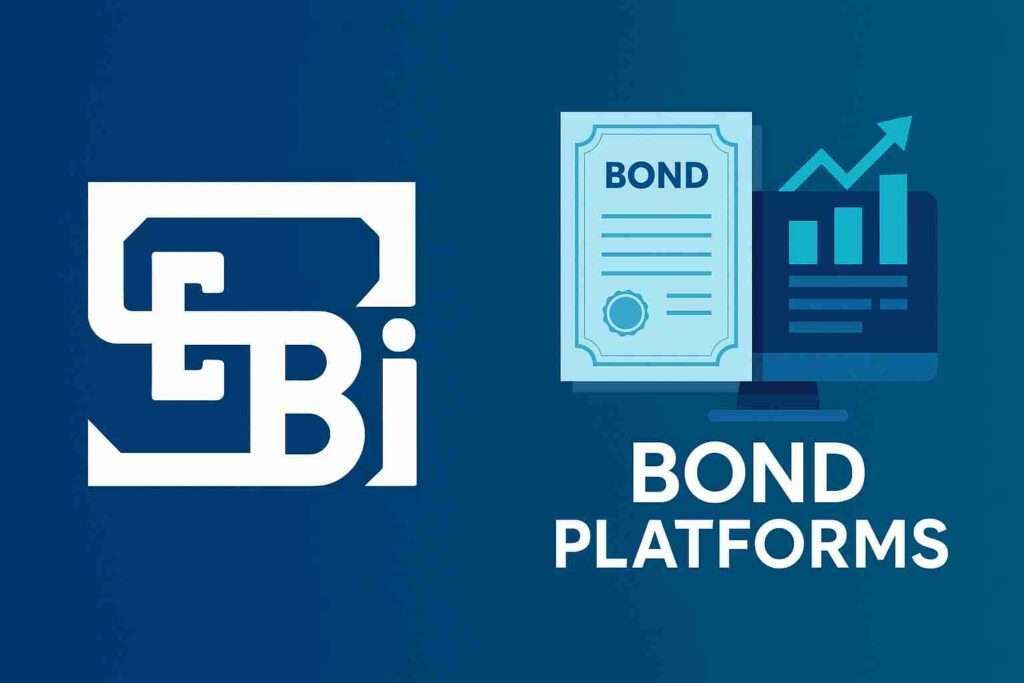SEBI has issued a fresh public caution against unregistered Online Bond Platform Providers (OBPPs) – many of them fintech apps or broker-backed platforms that look slick, run ads, and promise “easy fixed-income returns”, but operate without any SEBI-recognised licence.
For years, corporate bonds were an “exclusive club”. If you did not have ₹10 lakh, you were not even allowed near the door. Today, that same market opens with a ₹10,000 ticket. Naturally, retail investors rushed in.
And like every fast-growing corner of the financial world, new platforms also rushed in — some polished, some half-built, some operating in a grey space that investors rarely notice.
Now, SEBI has issued a sharp public advisory. Not a routine one — a direct warning.
SEBI’s Warning Isn’t About Bonds — It’s About Where You Buy Them
SEBI’s message is clean and to the point: Several online platforms offering bond investments are not authorised to do so.
Unlike regulated OBPPs (Online Bond Platform Providers), these unregistered portals do not operate under any regulatory structure. No exchange routing, no investor-protection system, no accountability if something turns sour.
And here’s the part most investors miss: Just because a platform has a slick UI, instant KYC, colourful charts, or fancy yield pop-ups does not mean it’s regulated by SEBI, RBI, or any Govt bodies.
SEBI has also reminded investors of previous enforcement actions — particularly those involving platforms that were selling privately placed bonds to the public. These were not accidental violations. They were structured models built outside the rules.
Why the Crackdown Matters Now
Retail participation in bonds has jumped sharply in the last two years. When participation rises, mis-selling also rises. The corporate bond market turnover in FY25 was approximately ₹17.1 lakh crore, with a projected rise to around ₹23.8 lakh crore in FY26, according to livemint.com.
Unregulated portals often use:
- higher yields to attract small-ticket investors,
- limited disclosures,
- and “easy investment” messaging that hides bond structure, liquidity risk, and issuer health.
SEBI’s concern is simple: When a platform is unregulated, the investor’s risk isn’t just credit risk. It becomes a platform risk.
Quick Table That Tells You If a Platform Should Be Trusted
| Check | What You Must See | What It Means |
|---|---|---|
| OBPP Registration | Mention of NSE/BSE-registered OBPP | The Platform is authorised under the SEBI framework |
| Exchange Routing | Clear note that orders go through the NSE/BSE systems | Your trade settles under verified infrastructure |
| Full Disclosures | Rating, issuer, yield, liquidity, risk summary | Nothing is hidden behind marketing banners |
| Grievance Mechanism | SCORES link & escalation steps | There’s a real path if things go wrong |
If even one of these boxes is unchecked, the platform deserves a pause.
Here, on SEBI’s official verification page, you can check all India-regulated platforms under the Government: sebi.gov.in/online-bond-platform-providers
Easemoney Research: Real Risks Investors Overlook
Retail investors often assume “bond = safe”.
However, unlike fixed deposits, bonds come with a clear structure, settlement, and a rules framework. And when those layers are bypassed, new risks appear — risks you do not see on the app screen.
Here are Easemoney’s findings from tracking this space:
- The ‘Yield Illusion’
Unregistered platforms often highlight yield but skip over the stability of the issuer. High yield becomes the bait, and the missing disclosures become the trap.
- The Misplaced Trust Problem
Some portals market themselves like mutual fund apps. Same fonts. Same style. Same onboarding.
But they do not follow the same rules; investors assume trust where none exists.
- Hidden Liquidity Issues
Unlike listed bonds on proper OBPPs, some platforms push securities with almost no secondary liquidity. If an investor wants to exit early, they may find no buyers.
- The Private-Placement Backdoor
This is the big one. Certain platforms were taking privately placed securities and reselling them to the public. SEBI has already acted against such models before, because they blur the legal boundary between private placement and public issue.
New or Retail investors today are not making wrong decisions; they choose based on incomplete information. Bond investing is absolutely fine. Buying bonds from the wrong platform is not.
- The next phase of India’s bond-growth story depends on one simple habit: Firstly, verify your platform before you verify your yield.
Easemoney will continue tracking every OBPP addition, removal, enforcement action, and platform risk pattern, so you always know which platforms are legitimate, which are in the grey, and which deserve a red flag.

